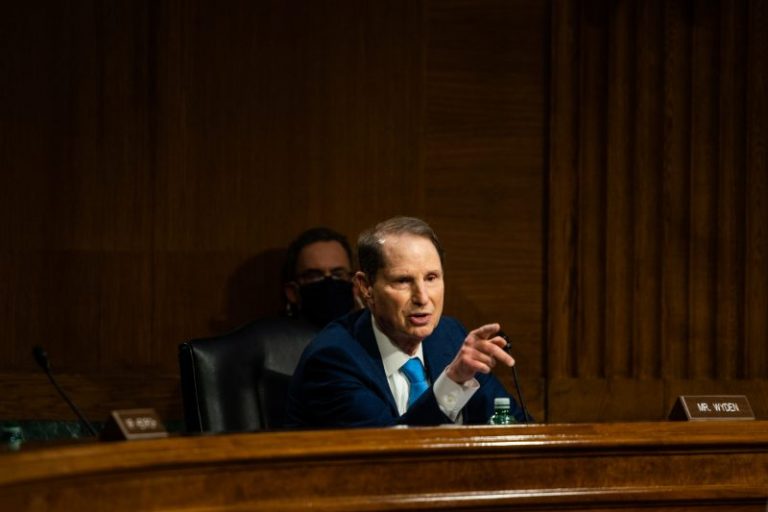A top Senate Democrat is demanding answers from Social Security’s embattled watchdog about allegations of low productivity, poor morale and retaliation against whistleblowers in her office.
In an 11-page letter sent this week, Senate Finance Committee Chairman Ron Wyden (D-Ore.) said his committee had received complaints from current and former employees in the watchdog division of a hostile work environment, hiring abuses, misuse of federal money and “falling productivity.”
“I write to express my concerns regarding your performance as Inspector General,” Wyden wrote. “It is paramount that the Office of Inspector General cultivates and maintains a workplace free of harassment, intimidation, or retaliation.”
The letter comes as multiple investigations continue into Inspector General Gail Ennis’s oversight of a $200 billion disability benefits program administered by Social Security. Before she took office in January 2019, changes to the anti-fraud program initiated by her predecessor resulted in unprecedented penalties against more than 100 disabled claimants — with some fines reaching hundreds of thousands of dollars.
Ennis continued the practice, then sidelined two senior officials who exposed it, Wyden said in his letter, which follows several reports in The Washington Post last year on the fines levied under the Civil Monetary Penalty program and the subsequent retaliation claimed by the whistleblowers.
Rebecca Rose, spokeswoman for the inspector general’s office, said in an email that Ennis “has received the letter from Chairman Wyden and appreciates the opportunity to clarify the issues raised in the letter.”
The anti-fraud program relies on civil penalties to recoup money for the government when a claimant receives improper disability benefits. The sums are considered too small for criminal prosecution.
As The Post reported, the penalties were issued without due process and disregarded federal regulations, deviating from how the government had recovered money since the program’s inception in 1995. Attorneys were directed to stop taking into account claimants’ financial state, their age, their intentions and level of remorse, among other factors.
“To be clear, those who commit fraud should be held accountable,” Wyden wrote in his July 17 letter, noting that Congress approved a system of civil penalties. “However, Congress also explicitly instructed [The Social Security Administration] to protect each individual’s due process rights, and to carefully consider the circumstances of the offense and the individual — including his or her financial condition — when determining the appropriate penalty amount.”
Wyden noted that after two senior officials pointed out these errors in the program’s enforcement, “instead of addressing the errors — even after a secondary review confirming the initial review’s findings — your office chose to not notify [Social Security officials] or the individuals affected.”
Following The Post’s reporting in May 2022, acting Social Security commissioner Kilolo Kijakazi opened an investigation into Ennis’s oversight of the program. Two other inquiries into her conduct were launched by the Council of the Inspectors General on Integrity and Efficiency (CIGIE), a group that investigates misconduct claims against inspectors general, and by the Office of Special Counsel, an independent office that protects federal employees and whistleblowers. Kijakazi ordered Ennis to suspend the program.
“The inquiry has moved forward in diligence and is ongoing,” Nicole Tiggemann, a Social Security spokeswoman, said in reference to Social Security’s investigation, which is reviewing penalties dating to 2015, a federal official said.
A spokeswoman for Justice Department Inspector General Michael Horowitz, who is leading the CIGIE probe at the White House’s request, declined to comment.
The Project on Government Oversight, a watchdog group that monitors federal inspectors general, has called on President Biden to fire Ennis, who was appointed by former president Donald Trump.
In his letter, Wyden directed Ennis to tell him how she plans to address plummeting audits and morale on her staff of 500 auditors, criminal investigators and attorneys. The office ranked at the bottom of small agencies this year on the Partnership for Public Service’s survey of the Best Places to Work in the Federal Government.
Wyden sent Ennis a letter in 2021 that sounded some similar themes, and noted in this week’s letter that “you committed to my staff to make substantial changes to improve morale.”
Senate Finance Committee investigators in both parties were briefed by current and former employees on Ennis’s staff in recent months. Sen. Mike Crapo (R-Idaho), the committee’s top Republican, declined to sign this week’s letter. A spokeswoman for Crapo declined to comment.

